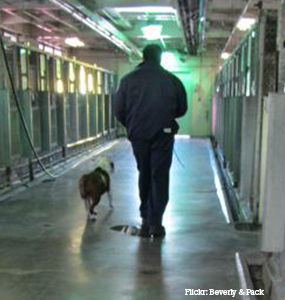
Dr. Justine Lee implores you to adopt a shelter dog. For more from Dr. Lee, find her on Facebook or at www.drjustinelee.com!
Often, veterinarians (and pet owners) fall into two different categories of dog owners: either those who own only purebreds or those that only own rescued Heintz-57 varieties.
And honestly, either way is fine.
After all, maybe you’re set on a particular breed. You know exactly what color, size, characteristics, traits, and sex of dog that you want. The great thing about purebred dogs is you know exactly what you’re getting (for the most part) – the size, coloring, and traits are all generally similar. However, keep in mind that depending on the popularity of a breed, there may be a smaller gene pool (especially the rarer the dog breed), and the potentially for irresponsible inbreeding may occur… particularly if you go with a puppy mill or pet store. With that comes an increased risk of potential genetic diseases such as cancer, hip dysplasia, heart disease, dental disease, and eye problems.
Personally, there are several breeds of dogs I’d love to have. I’m particularly fond of working dogs due to their smarts, but have a few small breed dogs that I love for their friendliness and affection (especially the Bichon Frise, Jack Russell terrier, and Maltese).
 But, in my heart, I’m a rescue-advocate. That’s because my general philosophy is “Don’t breed or buy when homeless animals die.” So, I wanted to make sure everyone was aware that October was Adopt a Shelter Dog Month!
But, in my heart, I’m a rescue-advocate. That’s because my general philosophy is “Don’t breed or buy when homeless animals die.” So, I wanted to make sure everyone was aware that October was Adopt a Shelter Dog Month!
If you’re wondering what type of dog to get and don’t have your heart set on anything, consider a mutt. Here are three reasons why shelter dogs beat buying purebred dogs.
Hybrid Vigor and Potentially Less Medical Problems
Back when it was cool and hip to marry your relative (think European royalty), a prevalence of genetic problems increased (e.g., hemophilia, etc.) due to inbreeding depression. This increased the risk of recessive – and potentially deleterious - traits.
Likewise, back in the mid-18th century, Mendel demonstrated the importance of genetic diversity with his work on plant hybridization. So, how does this relate to mutts? With mixed breed dogs, there’s less of a chance for inherited diseases. That doesn’t mean that mutts are guaranteed to be problem free, but they may have less risk of certain inbred diseases thanks to more genetic variability.
Cost Savings (Lower Hospital Bills)
Certain pet health insurance companies don’t cover breed-related problems. For example, if you have a German shepherd dog, your insurance may not cover hip dysplasia… meaning you’re stuck with a larger bill for total hip replacement surgery or chronic pain medication.
Thankfully, due to more responsible breeders who are screening their dogs for hip dysplasia (through specific x-ray tests like the PennHIP or OFA tests), we are seeing a decrease in this inherited disease. That said, irresponsible breeders may not be doing this, resulting in more costs (both financially and emotionally!) to you if you purchase a purebred with numerous inherited diseases. By adopting a mix-breed dog, you often can help minimize the potential for high-risk, inherited diseases. Which is exactly what your pet health insurance is hoping too, based on the numbers!
Save a Life! (and Get More Unconditional Love in Return)
While all dogs give love selflessly, I personally feel like shelter dogs love you just a bit more! I’m sure I’m anthropomorphizing here, but once they leave the dingy cage or dirty run from the shelter, they seem to never forget that you rescued them!
With adoption, you’re also rescuing a dog that may have been euthanized due to overcrowding or other causes. Help save a life and consider adopting if you’re amenable to a Heinz-57!
If you have any questions or concerns, you should always visit or call your veterinarian – they are your best resource to ensure the health and well-being of your pets.
